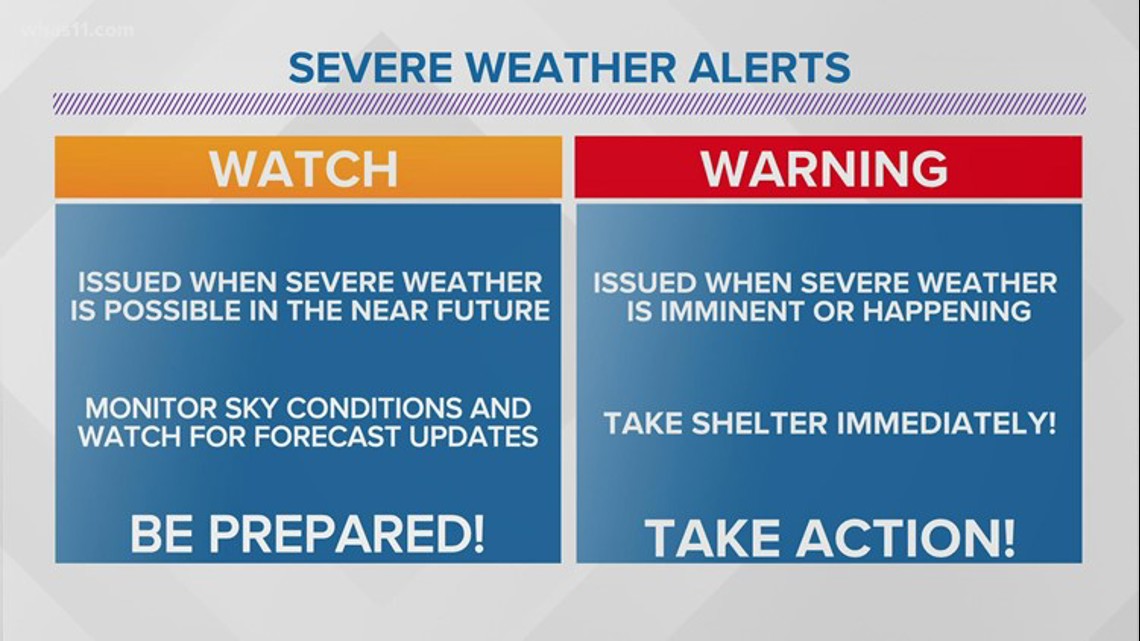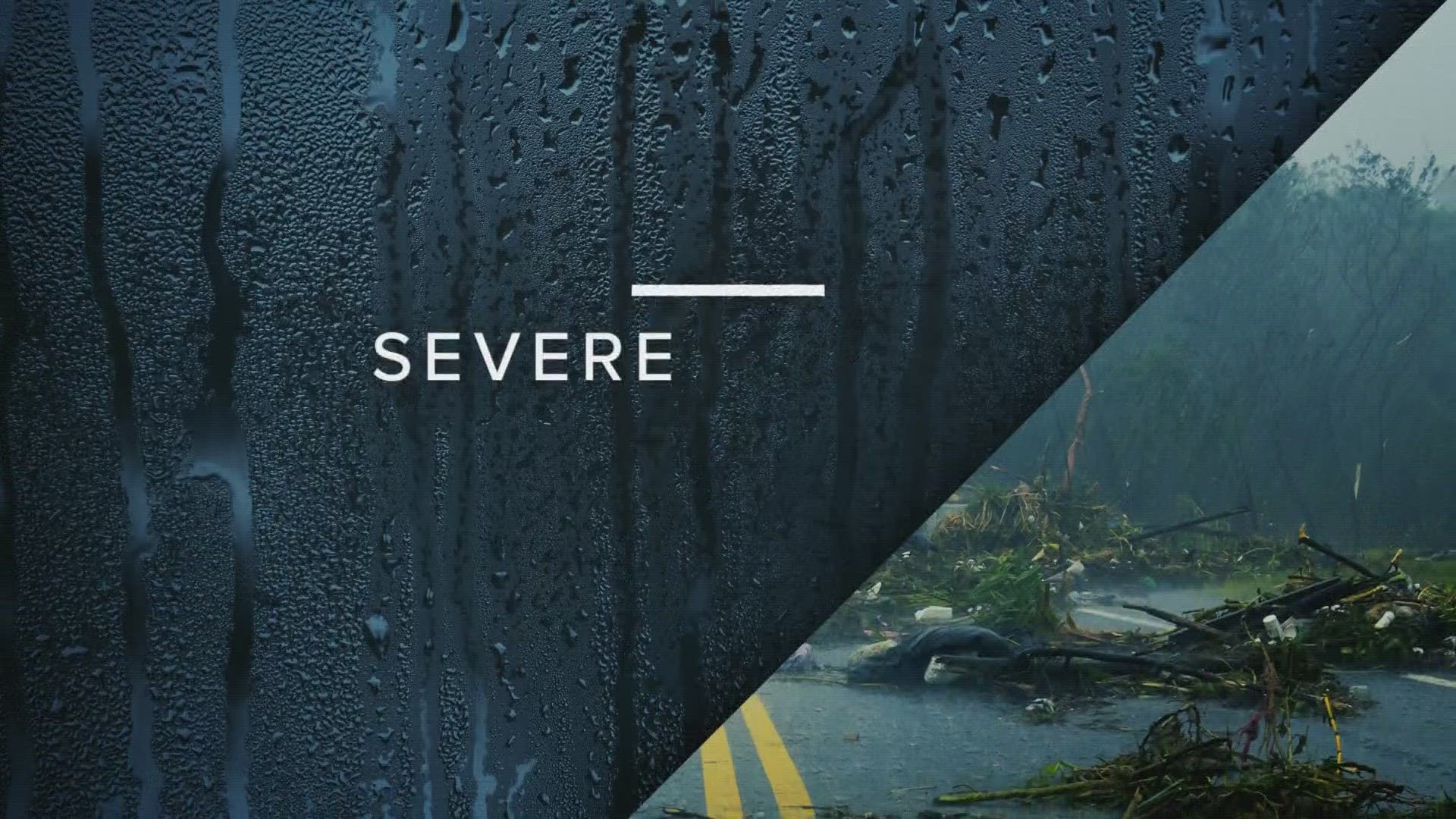GRAND RAPIDS, Mich. — When severe weather strikes, the National Weather Service can issue watches and warnings for the area. Here in West Michigan, the Grand Rapids office is responsible for issuing these types of weather alerts.
Knowing the difference between a watch and a warning and how to react to them can save lives.
So let’s break them down.
SEVERE THUNDERSTORM WATCH VS WARNING
Severe Thunderstorm Watch: This means that severe thunderstorms are possible in the area. It's time to make plans to move to a safe location if/when a severe thunderstorm warning is issued.
Severe Thunderstorm Warning: Severe weather is here. It's an urgent announcement that a severe thunderstorm has been reported or is imminent, and you should take cover right away.


Steps you can take right now to stay safe
Get inside before the storm. Seek shelter in your home, a nearby building, or a hard top car (not a convertible) if there is a severe thunderstorm. Injury can still happen inside a car if lightning strikes, but it is still safer than being outside.
After the storm: Once the storm is over, be sure that there are no new storms developing, check on neighbors who may need assistance, stay away from any storm damage and report any fallen trees or powerlines.
Know what to do if the power goes out.
- Never use a grill or a portable generator inside. When the power goes out, people rely on portable generators for power and grills to heat food. Using these appliances properly will keep you and your family safe in an emergency. Portable generators, outdoor grills and other sources of fuel for heat or electricity cause carbon monoxide to build up if you are inside your home or garage. Carbon monoxide gas is colorless, odorless and deadly. Always keep your grills and generators at a safe distance away from your home. Even setting up next to an open window can allow for carbon monoxide to get inside your home.
- Keep food safe when the power goes out. If the power has been out for four or more hours, throw away any perishable items in your refrigerator, such as meat, poultry, fish, eggs, leftovers, etc. Food in the freezer may stay safe for up two days if ice crystals remain in the center of the food. Visit www.foodsafety.gov for charts about what refrigerated foods and frozen foods are safe after a power outage.
WAYS TO GET WEATHER ALERTS
You should have multiple ways to stay weather aware and receive critical weather information:
1. NOAA Weather Radio
The first is NOAA Weather Radio. We often refer to them as the “smoke detector” for severe weather, because they will automatically sound an alarm in the case of a natural disaster or severe weather.
2. Local Broadcast
There is also always your local TV station. The 13 ON YOUR SIDE Weather Department streams on-air and online during an active storm.
Download the 13 ON YOUR SIDE app now. When you open the app, you can enable your location to be sent active alerts in your area.
You can see the latest severe weather alerts here.
3. Radio Station
Local radio stations should alert you if a storm is in your area. You can even set up devices like Alexa and Google Home to alert you with weather notifications.
4. Smartphone
Your smartphones also offer numerous ways to receive critical weather alerts. We have a 13 ON YOUR SIDE Weather App that will allow you to track the storm and receive alerts.
Download our weather app from the App Store for Apple Devices or for your Android device here.
5. Nixle Alerts
- Nixle is a FREE comprehensive warning system designed for rapid dissemination of alerts and public information to a variety of public mechanisms.
- Alerts and emergency information are received via text, email, web, and social media in real time for localized emergency situations relevant to the community.
- To register for NIXLE ALERTS
- Text your Zip Code to 888777
- Sign up and create a user profile at https://local.nixle.com/register/
6. Outdoor Sirens
Outdoor sirens are also an option, as they will go off in the threat of immediate danger, but are only meant to be heard outdoors. So, if you are inside, this should not be how you receive your severe weather alerts. Outdoor sirens can also be unreliable, difficult for those hard of hearing and go off for other reasons beyond tornadoes.
NOAA Weather Radios:
- Are designed for All-Hazards Warning and can be modified to alert those with special needs including deaf and hard of hearing, blind, etc.
- Are programmed to notify you of hazards within your area including tornados, severe thunderstorms, straight-line winds, downbursts, hail, hazardous materials spills, floods, etc.
- Will give you specific information about the storm and emergency protective measures you should take.
- Are set off automatically through local NOAA Weather Radio Towers when a warning is issued. Notifications occur within seconds of the warning.
- Are battery operated and will work when there is no power. Some models are handheld while others are also an AM/FM radio and alarm clock.
- On average, cost $20.00 per unit. Units are no more expensive to maintain than smoke detectors.
SHARE PHOTOS and VIDEOS
If you would like to add to our reports text your photos along with your name and location to 616-559-1310.
►Make it easy to keep up to date with more stories like this. Download the 13 ON YOUR SIDE app now.
Have a news tip? Email news@13onyourside.com, visit our Facebook page or Twitter. Subscribe to our YouTube channel.
Watch 13 ON YOUR SIDE for free on Roku, Amazon Fire TV Stick, Apple TV and on your phone.

